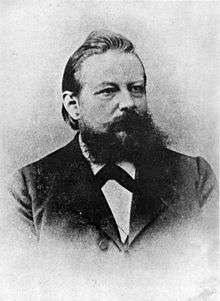Wilhelm Windelband
Wilhelm Windelband (/ˈvɪndəlbænd/; German: [ˈvɪndl̩bant]; 11 May 1848 – 22 October 1915) was a German philosopher of the Baden School.
Wilhelm Windelband | |
|---|---|
 Wilhelm Windelband, prior to 1905 | |
| Born | 11 May 1848 |
| Died | 22 October 1915 (aged 67) |
| Alma mater | University of Jena University of Berlin University of Göttingen (Dr. phil., 1870) |
| Era | 19th-century philosophy |
| Region | Western philosophy |
| School | Neo-Kantianism (Baden School) Foundationalism[1] |
| Thesis | Die Lehren vom Zufall (The Theories of Chance) (1870) |
| Doctoral advisor | Hermann Lotze |
| Doctoral students | Heinrich Rickert |
Main interests | Metaphysics, philosophical logic |
Notable ideas | The nomothetic–idiographic distinction |
Influenced
| |
Biography
Windelband was born the son of a Prussian official in Potsdam. He studied at Jena, Berlin, and Göttingen.
Philosophical work
Windelband is now mainly remembered for the terms nomothetic and idiographic, which he introduced. These have currency in psychology and other areas, though not necessarily in line with his original meanings. Windelband was a neo-Kantian who argued against other contemporary neo-Kantians, maintaining that "to understand Kant rightly means to go beyond him". Against his positivist contemporaries, Windelband argued that philosophy should engage in humanistic dialogue with the natural sciences rather than uncritically appropriating its methodologies. His interests in psychology and cultural sciences represented an opposition to psychologism and historicism schools by a critical philosophic system.
Windelband relied in his effort to reach beyond Kant on such philosophers as Georg Wilhelm Friedrich Hegel, Johann Friedrich Herbart and Hermann Lotze. Closely associated with Windelband was Heinrich Rickert. Windelband's disciples were not only noted philosophers, but sociologists like Max Weber and theologians like Ernst Troeltsch and Albert Schweitzer.
Bibliography
The following works by Windelband are available in English translations:
- Books
- History of Philosophy (1893) (two volumes) reprinted 1901, 1938 and 1979 by Macmillan
- History of Ancient Philosophy (1899)
- An Introduction to Philosophy (1895)
- Theories in Logic (1912)
- Articles
- "History and Natural Science" (J. T. Lamiell, transl.). Theory and Psychology 8, 1998, 6–22.
See also
References
- Windelband defended foundationalism in his book Über die Gewißheit der Erkenntniss. (1873)—see Frederick C. Beiser (2014), The Genesis of Neo-Kantianism, 1796–1880 (Oxford: Oxford University Press), p. 517.
- Frederick C. Beiser, The German Historicist Tradition, Oxford University Press, 2011, p. 370.
- Sebastian Luft (ed.), The Neo-Kantian Reader, Routledge 2015, pp. 461–463.
Further reading
- Rickert, Heinrich (1929) [1915]. Wilhelm Windelband (2nd ed.). Tübingen: J.C.B. Mohr.
- Mayeda, Graham (2008). "Is there a Method to Chance? Contrasting Kuki Shūzō's Phenomenological Methodology in The Problem of Contingency with that of his Contemporaries Wilhelm Windelband and Heinrich Rickert". In Hori, Victor S; Curley, Melissa Anne-Marie (eds.). Frontiers of Japanese Philosophy II: Neglected Themes and Hidden Variations. Nagoya, Japan: Nanzan Institute for Religion and Culture.